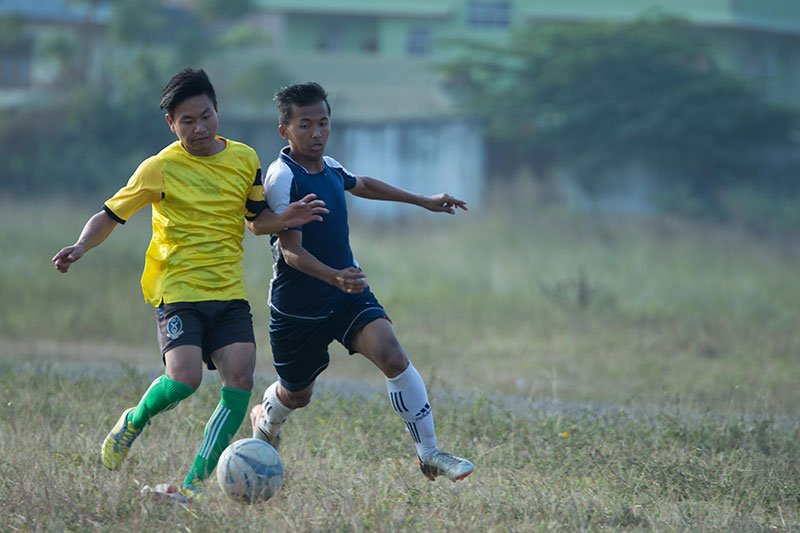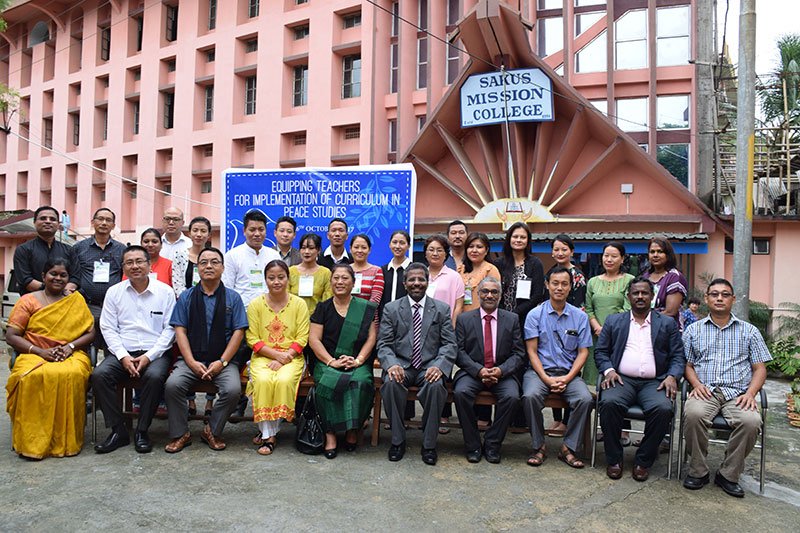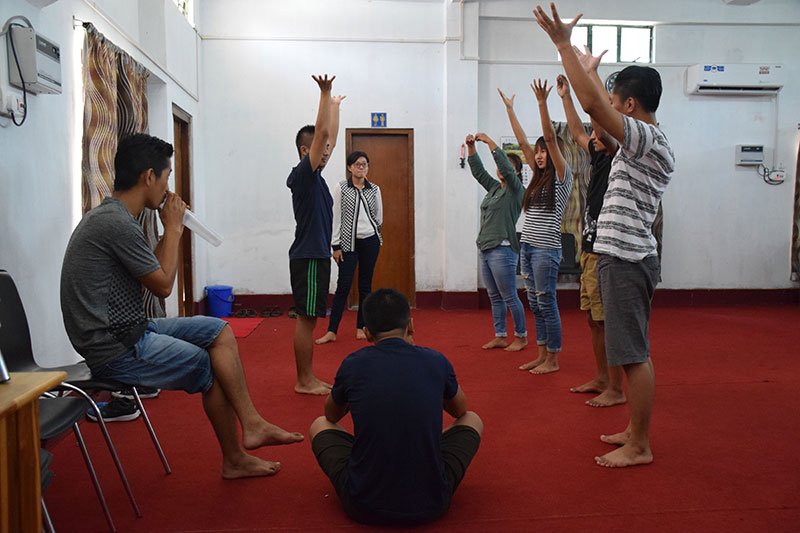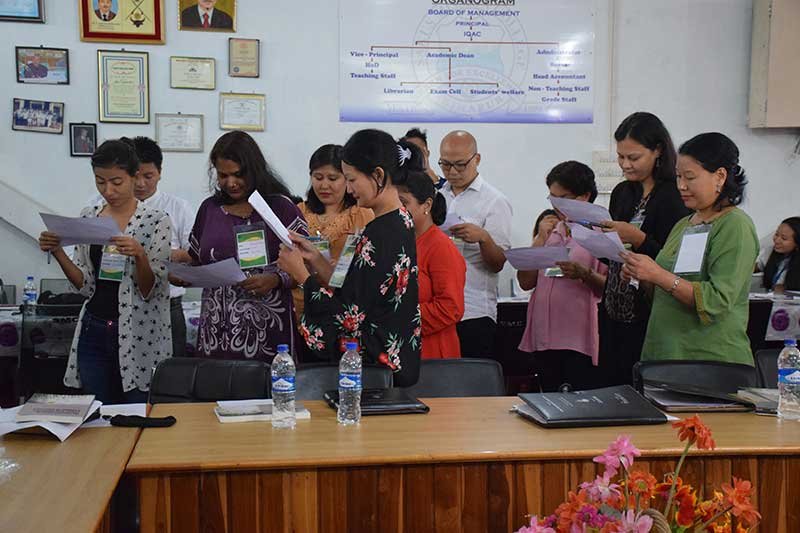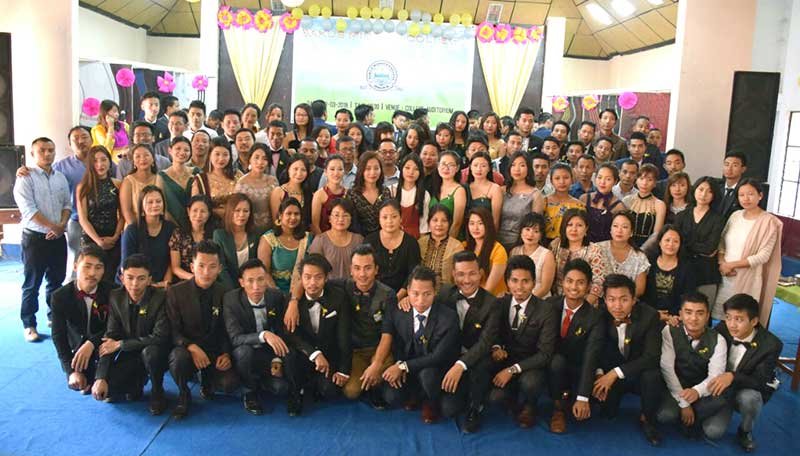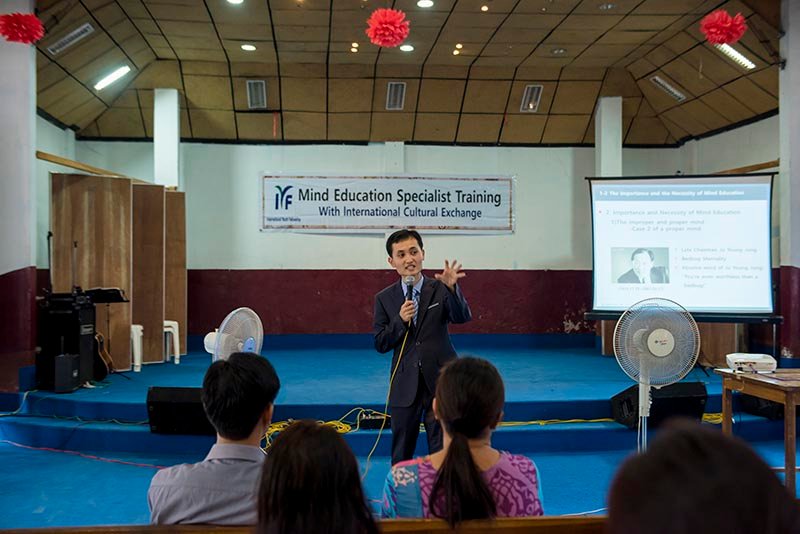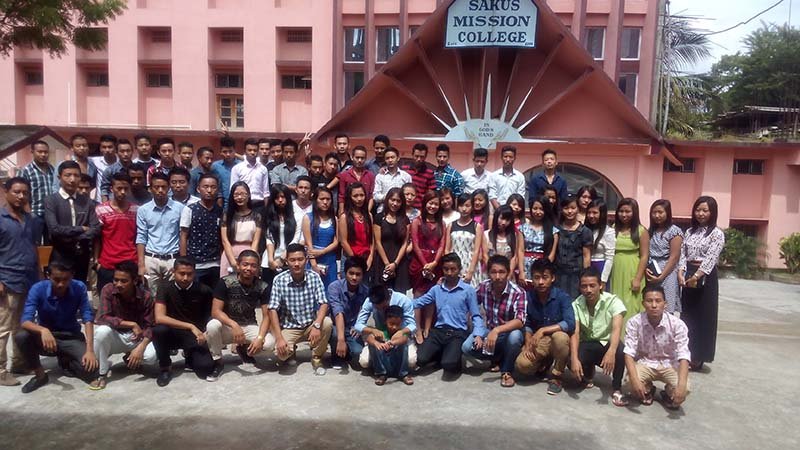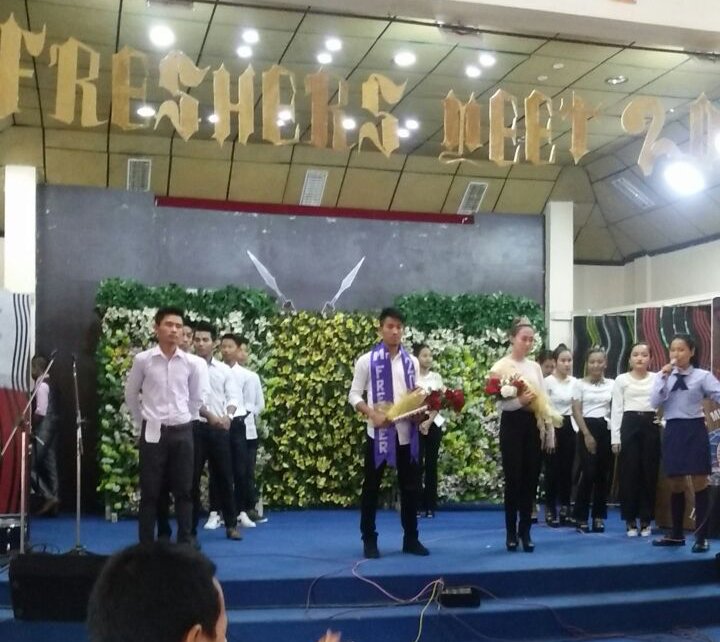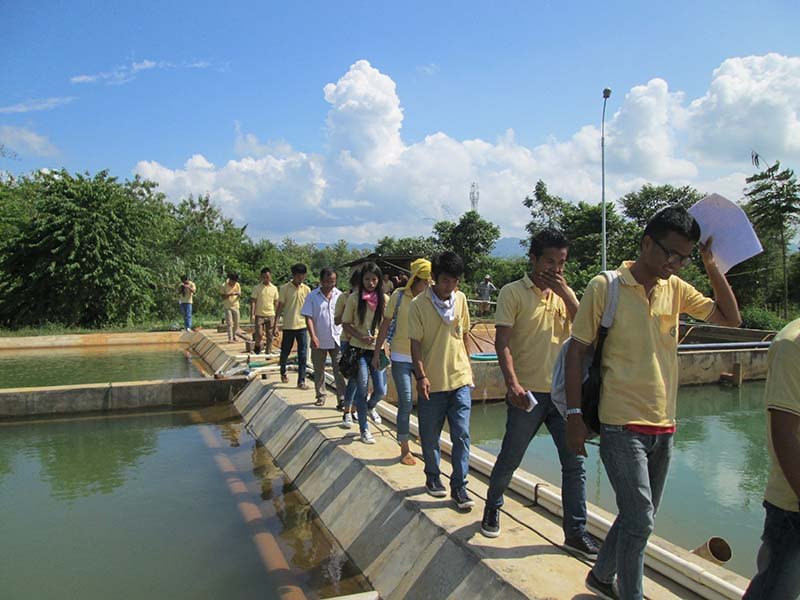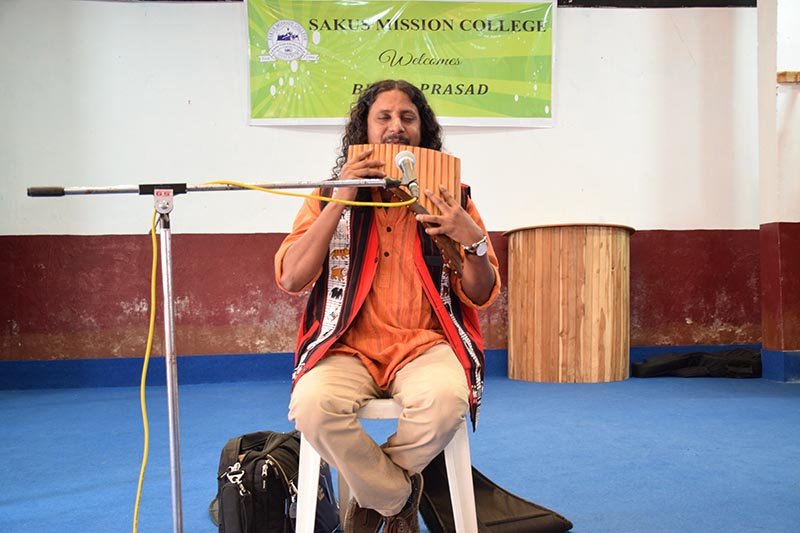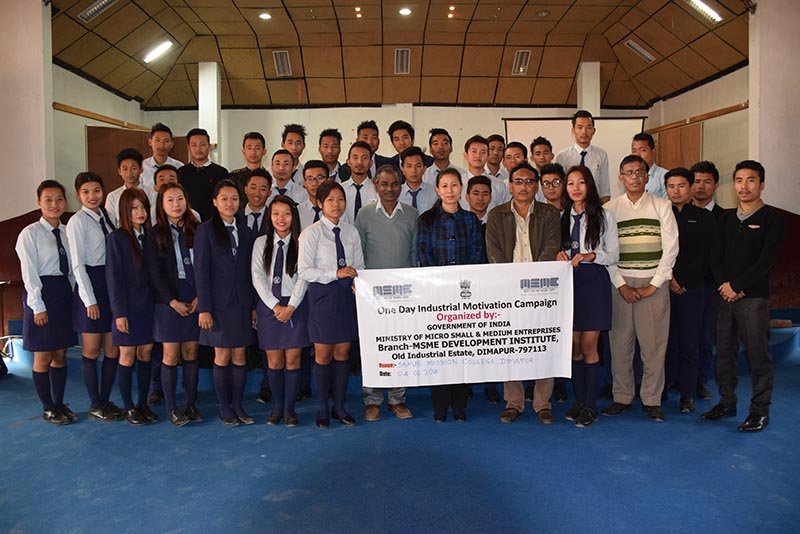In order to improve all round development of the students, besides the academic courses, Co-curricular activities are conducted alternatively on Saturdays. The College alsoconducts Annual Sports Week after the completion of Selection Exam i.e. in the Month of November every year. Students are given the opportunity to show their talent in different events. The College is proud to have an Indoor Badminton Stadium, Swimming Pool & a permanent playing field for the Basket Ball, Volley Ball, etc. Moreover the college is closed to State Stadium. Hence, Major events e.g. Football, Track & Field, Cricket, etc., being played whenever necessary in the State stadium.
- National Service Scheme:
The NSS Unit of the Sakus Mission College was launched in the year 2003 with onehundred volunteers and one Programme Officer. Over time, the number of volunteers has increased to two hundred. With two Programme Officers, the college NSS Unit has sent volunteers to participate in the state level and the national level programmes held at various places in the mainland India. - Red Ribbon Club:
The Red Ribbon Club of SMC was established in the year 2010 as per the direction of the State Government. At present the club has fifteen members with a Leader, and it functions according to the guidelines of the organization. The Club in line with the set goals and principles of the organization has modestly contributed to the cause of the society in general and the youth in particular. - Worship Committee:
As spiritual needs of the students is regarded as the core component, and, its fulfillment an important part of the College establishment, the Evangelical Union was established in the mid-academic session 2010-2011. Ever since, the EU is performing its ordained duties catering to the moral and spiritual needs of the students in and outside the college. - Career Guidance & Counseling Cell:
Along with academic education, Sakus Mission College provides supplementary services to students which help them in honing and perfecting their skills as they venture out of the college in pursuit of a brighter future. Career Guidance & Counseling Programs aims to help students make more informed and better educational and career choices. Among other things, programs offer information on career options, the type of academic and occupational training needed to succeed in the workplace, and post-secondary opportunities that are associated with their field of interest. Programs also often provide teachers, administrators, and parents with information they can use to support their ward. The CGCC plays a key role in supporting State’s efforts to build and implement the following programs which are in the nature of:
i) Advising dual/concurrent enrollment and Advanced placement credits to prepare students for the rigors of higher education.
ii) Post-secondary financing that can be used to support advanced education and training.
iii) Specialized counseling and intervention services with individualized attention. - Seminar & Workshop:
To impart “Quality Education” to the student’s community and equip the teachers to handle various academic activities more effectively, the college conducts Seminars & Workshop according to the needs of the students, staff and the teaching fraternity. Besides these, faculty seminar (departmental wise) is being held every month. - Music:
Throughout history, in all cultures, music has been an integral part of human life. As such students intending a career in music or those pursuing their own love of the art, the Department of Music offers course in theory and lessons in performance as part of the CBCS for 5th and 6th semester students. - Sports Training Centre:
With the added facility of SMC sports training centre (Badminton, Table Tennis, S wimming Pool, Volley/Basketball, football etc.) interested students can enroll under any of the above mentioned (sport) discipline which willbe manned by competent coaches. - Eco Club:
Eco Club plays an important role in creating environmental awareness amongst the future generation. The Club motivates the students to keep their surroundings green and clean by undertaking plantation of trees, promote ethos of conservation of water, imbibe habits and life style for minimum waste generation, and sensitize the students to minimize the use of plastic bags as they choke drains and sewers, cause water logging etc. - Placement Cell:
Sakus Mission College has incepted a Placement Cell named SMPC (Sakus Mission Placement Cell). The main venture of SMPC is to get students placed in reputed multinationals, government jobs, NGO’s and the private sector, all registered students with SMPC will be entitled to placement assistance, counselling for employment and even self- employment. The SMPC assures support to the visiting companies at every stage of the placement process by making college infrastructure available to them. - Women Development Cell:
Women Development Cell (WDC) aims to provide and maintain a dignified, congenial working environment for women employees (including teaching, non-teaching and contractual workers) and students, where they can work, study and explore their potential to the fullest. WDC sensitizes on gender discriminations and sexual harassment and encourages involvement through academic, cultural and other activities such as talks, seminars, workshops, community action, poster – making etc. - Community College:
Sakus Mission College has been selected as a Community College by UGC for the session 2015-2016. Realizing the importance and the necessity for developing skills among students, and creating work ready manpower on large scale, it offers “Diploma Course in Dress Designing and Tailoring” under Community College Programme(Approved by UGC). - Remedial Coaching:
Remedial Coaching is designed for all students with or without special needs. Remedial Coaching/Instruction can help struggling learners shore up their basic skills. This extra support can help them catch up to their peers. - Student’s Grievances Cell:
The College has a student’s grievances redressal cell. The objective is to develop a responsive and accountable attitude among all the stakeholders in order to maintain a harmonious educational atmosphere in the institute. - Mentoring:
The college started Mentor-Mentee programme with an understanding to achieve a collaborative learning relationship, sharing mutual responsibility and accountability. - Alumni:
The College has distinguished alumni association. Our alumni serve the state in diverse areas that include governance, corporate sector, art and culture, politics, media, policy planning, and research. The alumni are involved in the life of the College by way of enriching its academic and co-curricular profile, interacting with the Junior Members and enlarging the frontiers for their multi-faceted training. - ANTI-RAGGING COMMITTEE GUIDELINES
Ragging is totally prohibited in the premises of the college and anyone found guilty of ragging or abetting ragging, whether actively or passively, or being a part of a conspiracy to promote ragging is liable to be punished in accordance with the UGC regulations on curbing the menace of ragging in higher educational institutions.
The following acts shall be considered as ragging:- Any conduct by any student or students which have the effect of teasing, treating or
handling with rudeness a fresher or any other student. - Indulging in rowdy or undisciplined activities by any student or students which
causes or is likely to cause annoyance, hardship, physical or psychological harm or to
raise fear or apprehension in any fresher or any other student. - Asking any student to do an act which such student will not do in the ordinary course
and which has the effect of causing or generating a sense of shame or embarrassment so
as to adversely affect the physique or psyche of the student. - Any act by a senior student that prevents, disrupts or disturbs the regular academic
activity of any other student or a fresher. - Any act of financial extortion or forceful expenditure burden put on a fresher or any
other student.
PUNISHMENTS:
The following punishments depending on the nature and gravity of the offence shall be
awarded to those found guilty:-- Expulsion from the college and consequent debarring from admission to any other
institution for a specified period. - Suspension from attending classes and other academic privileges.
- Debarring from appearing in any test/examination or other evaluation process.
- Withholding results.
- Cancellation of admission.
- Suspension/Expulsion from the hostel.
- When the persons committing or abetting the act of ragging are not identified, the
college shall resort to collective punishment.
Note: In the case of any ragging incident, the students may immediately bring it to the
notice of the members of Anti-Ragging Committee of the college for necessary help,
guidance and actions.
ANTI-RAGGING COMMITTEE MEMBERS:
- Dr. Arenla Aier, Principal (Advisor)
- Mr. Aosanen Jamir, HoD, Department of Economics (Faculty Representative)
- Mr. Bendangonen, Warden, Boys Hostel (Member)
- Ms. Takunaro Jamir, Warden, Girls Hostel (Member)
- Class Representatives, B.A. 1st Semester (Fresher’s Representative)
- President, SMCSU (Senior student Representative)
- Alem Obangmenla Jamir (Parents Representative)
- Any conduct by any student or students which have the effect of teasing, treating or

